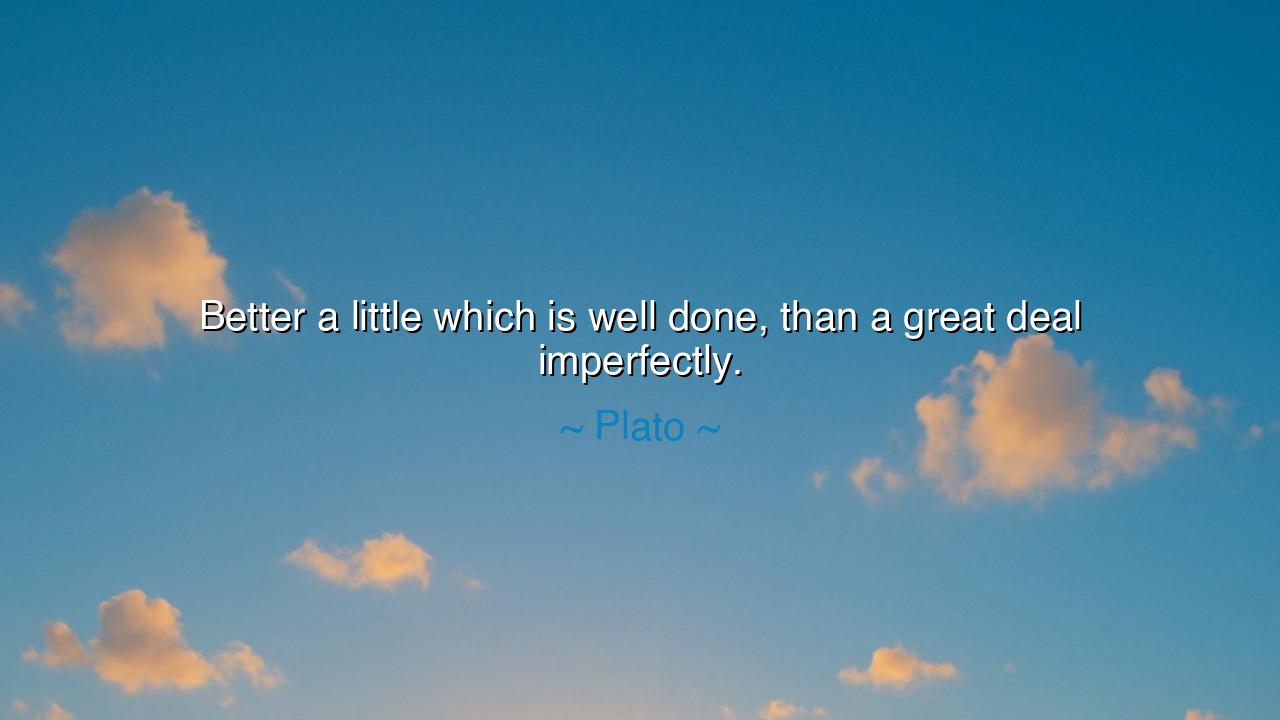
Better a little which is well done, than a great deal






“Better a little which is well done, than a great deal imperfectly.” Thus spoke Plato, the philosopher whose words still echo through the corridors of time. In this simple yet profound saying, he gives voice to a law that governs all creation — that quality surpasses quantity, and that excellence, though small in measure, is greater than abundance without substance. The ancients understood that a single noble act, a single thought pursued to perfection, outweighs a thousand careless deeds. For the soul grows not through the many things it touches, but through the few things it embraces with depth and devotion.
Plato’s words arise from his lifelong pursuit of the ideal, the eternal form of truth that lies beyond the shadows of this world. In his teaching, all things are reflections of higher perfection — the craftsman’s art mirrors the form of beauty, the statesman’s justice mirrors the form of goodness, and the philosopher’s inquiry mirrors the form of wisdom. To do “a little well,” therefore, is to approach the divine; to do “a great deal imperfectly” is to remain trapped in illusion. The unwise scatter their energy across many things, achieving nothing fully. But the wise, like sculptors, carve patiently, knowing that perfection comes from discipline, focus, and care.
Consider the story of Leonidas and the Three Hundred at Thermopylae. Against an empire vast as the sea, they stood as but a handful of men — “a little,” in the eyes of the world. Yet their courage was well done: absolute, unwavering, and pure. Their stand became immortal, not because of its size, but because of its perfection. The armies of Persia marched on, but their greatness dissolved into dust; the small act of perfect valor endures in memory as an eternal flame. Thus, Plato’s truth is revealed: a little done with excellence becomes infinite, while a multitude of careless deeds fades like smoke.
Plato’s teaching also reflects the harmony of nature. A single drop of pure water refreshes more than a flood of bitter brine; a single note, struck with precision, carries more beauty than a thousand discordant sounds. The soul, too, must learn this art of restraint. He who rushes from task to task, from pleasure to pleasure, gathers nothing. He lives in fragments. But he who gives his whole being to one purpose — to a craft, a virtue, a cause — becomes complete, for his labor reflects the unity of the cosmos itself. The gods, said Plato, favor the one who does not multiply his works but perfects them.
In the realm of the spirit, this truth shines even brighter. The philosopher who contemplates one truth deeply may see further into eternity than the scholar who collects a thousand facts without understanding. The artist who paints one perfect canvas reveals more of beauty’s soul than one who splashes colors on many. And the man who loves one soul truly contributes more to heaven than he who flatters the world. The power of excellence is not in its size, but in its purity.
History offers us the example of Michelangelo, who spent years painting the ceiling of the Sistine Chapel, often lying on his back in pain and exhaustion. Many artists of his age produced countless works, filling galleries and palaces, but few endure in the hearts of men. Michelangelo’s “little,” though but one ceiling, was “well done,” and so it stands eternal. It was not the quantity of his work that made him immortal, but the perfection of his devotion. So it is in all things: the effort guided by patience and love outlives the haste driven by ambition.
Therefore, O seeker of wisdom, heed this lesson: do not rush to do much; rather, do well what you are called to do. Let every action, however small, bear the mark of care and virtue. Speak fewer words, but make them true. Attempt fewer tasks, but perfect them with your whole heart. For what is a life but a work of art in the making? And the masterpiece of life, like all masterpieces, is not made by excess, but by excellence — by the hand that shapes slowly, by the mind that chooses wisely, and by the spirit that gives fully.
So let Plato’s teaching guide your path: “Better a little which is well done, than a great deal imperfectly.” In an age that prizes speed over depth, noise over harmony, abundance over authenticity, remember that greatness dwells not in the many, but in the meaningful. Strive not to do everything, but to do something with truth, with beauty, and with soul. For a single deed well done is a monument to eternity — and eternity, after all, has no need for the imperfect.






AAdministratorAdministrator
Welcome, honored guests. Please leave a comment, we will respond soon